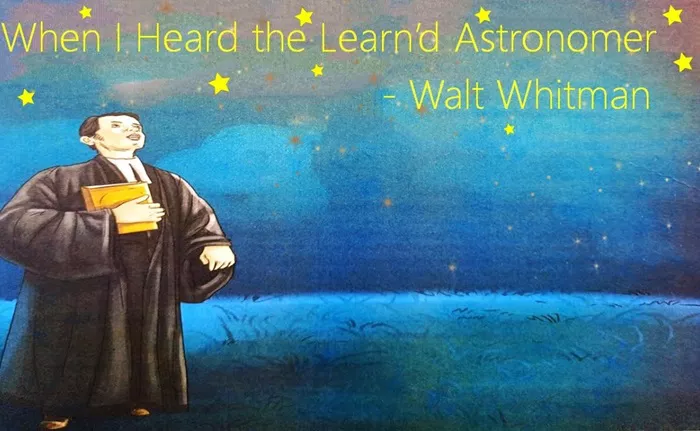The universe, infinite and profound, has long captivated humanity. Poets throughout history have drawn inspiration from the cosmos, exploring its beauty, mystery, and its connection to human existence. This article delves into seven remarkable poems of the universe and life. Presented in order, these poems reveal how the cosmos has shaped our understanding of existence and ourselves.
1. “When I Heard the Learn’d Astronomer” by Walt Whitman
Whitman’s iconic poem examines the divide between scientific understanding and emotional experience. The narrator listens to a learned astronomer lecture about the stars using charts, diagrams, and facts. Overwhelmed and disenchanted, the narrator steps outside to simply gaze at the night sky:
“In the mystical moist night-air, and from time to time,
Looked up in perfect silence at the stars.”
Whitman’s poem suggests that the universe cannot be fully appreciated through analysis alone. Instead, it must also be felt. This reflective piece serves as a reminder that awe and wonder play vital roles in our relationship with the cosmos, enriching our sense of existence.
2. “Ozymandias” by Percy Bysshe Shelley
Shelley’s “Ozymandias” does not directly mention the cosmos, but its themes of time and impermanence resonate with the vastness of the universe. The poem tells of a shattered statue in a desert, symbolizing the fleeting nature of human power:
“Look on my Works, ye Mighty, and despair!”
Nothing beside remains.”
The image of a great empire reduced to ruins mirrors humanity’s fragility against the backdrop of the eternal universe. Shelley’s work invites readers to contemplate their place in a cosmos where human achievements, no matter how grand, are dwarfed by the passage of time.
3. “The Tyger” by William Blake
Blake’s “The Tyger” captures a sense of childlike wonder and fear about creation itself. The tiger becomes a metaphor for the universe—beautiful yet incomprehensible. The poet marvels:
“What immortal hand or eye,
Could frame thy fearful symmetry?”
Blake’s questioning of the tiger’s origin reflects humanity’s attempt to understand the cosmos. The poem highlights the paradoxical nature of the universe, embodying both creation and destruction, beauty and terror. Its tone encourages readers to embrace curiosity and awe, even when faced with the universe’s mysteries.
4. “There Will Come Soft Rains” by Sara Teasdale
Teasdale’s hauntingly poignant poem imagines a world where nature thrives in humanity’s absence. While the poem doesn’t explicitly reference the universe, its themes of continuity and cosmic indifference are clear:
“And Spring herself, when she woke at dawn,
Would scarcely know that we were gone.”
The poem paints a picture of a self-sustaining world, untouched by human presence. This reflection on life’s transience within a vast, enduring universe reminds readers of the humility required to appreciate existence. It also invites us to find beauty in the natural world, independent of humanity’s influence.
5. “Stopping by Woods on a Snowy Evening” by Robert Frost
Frost’s “Stopping by Woods on a Snowy Evening” speaks to life’s journey and the pull of the unknown. While the poem focuses on earthly imagery, its exploration of time and obligation resonates with cosmic themes:
“The woods are lovely, dark, and deep,
But I have promises to keep.”
The narrator’s pause in the woods reflects a moment of contemplation—perhaps a longing to linger in the mysteries of life or even the universe. However, the journey must continue. Frost’s work is a metaphor for human existence: moments of wonder are fleeting, yet they shape the way we understand our place in the larger scheme of things.
6. “Stars” by Carl Sandburg
In “Stars”, Sandburg transforms the night sky into a living entity. He describes the stars as “white faces laughing,” imbuing them with a sense of joy and vitality.
The poem draws attention to the stars’ enduring presence, serving as guides and companions to humanity. Sandburg’s anthropomorphic portrayal makes the universe feel less remote and more intimate. His work reminds readers that while the cosmos may seem vast and impersonal, it holds a personal significance for those who choose to connect with it.
7. “The Sun and Her Flowers” by Rupi Kaur
Contemporary poet Rupi Kaur often uses celestial imagery to explore themes of self-discovery and resilience. In one of her works from The Sun and Her Flowers, she writes:
“You are your own soul mate, the stars within you.”
Kaur ties the universe’s grandeur to the human spirit, suggesting that the cosmos resides within each of us. Her metaphorical approach bridges the external universe with the internal one, encouraging readers to find strength and meaning in their own lives. Her modern perspective makes the vastness of the universe feel deeply personal.
Conclusion
These seven poems provide a journey through the universe and life, exploring themes of wonder, fragility, and meaning. From Whitman’s starry silence to Kaur’s modern metaphors, each piece captures a unique facet of humanity’s connection to the cosmos. Through their verses, these poets remind us of life’s fleeting beauty and the enduring mysteries of existence. The universe, with its infinite expanse, mirrors the complexity of human emotions and aspirations. Whether we gaze outward at the stars or inward at our own souls, poetry offers a path to understanding our place in the grand cosmic story.

